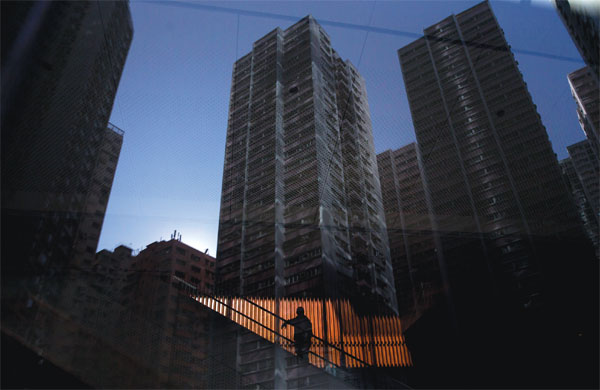Property price rises 'at the end of the road'
Updated: 2015-03-18 06:27
By Oswald Chan in Hong Kong(HK Edition)
|
|||||||||
|
Hong Kong's property market may take the hit as further interest-rate hikes will raise mortgage costs, with hot money in the market fleeing from Hong Kong to Europe and Japan due to a stronger US dollar. Brent Lewin / Bloomberg |
Strong Hong Kong dollar, interest-rate hikes will dampen sentiment: Experts
Hong Kong's decade-long property price increases may be coming to an end due to a combination of currency appreciation and expected interest-rate hikes, real estate analysts say.
The city's average residential property prices rose by 13 percent last year, mainly driven by the seemingly insatiable demand for small- and medium-sized flats, Rating and Valuation Department data showed. Average apartment prices in this segment climbed by 15 percent in 2014, outperforming the overall market.
The Centa-City Leading Index - a market price gauge of Hong Kong's secondary homes market that stood at 138.8 for the week from March 16 - has risen more than 1.4 times since 2009 when the market tanked. The increase has been widely attributed to record-low interest rates, tight land supply and the influx of mainland buyers.
According to UBS Group AG, the price uptrend has been hit as spending by mainland tourists declines and mortgage costs rise.
"We expect a 5 to 10 percent drop in new property prices this year," and a 5-percent decline in shop rents, UBS property analyst Eva Lee said in an interview. "Once the high-end or mid-tier retailers start downsizing their shops, the macro economy is going to feel the crunch," she said.
The US Federal Reserve (Fed) is widely expected to begin raising interest rates sometime in June, and Hong Kong would have to follow suit under the linked exchange-rate mechanism.
A stronger-than-forecast US payroll report has strengthened the argument for raising interest rates as the jobless rate approaches the range that officials view as full employment.
Fed Chairperson Janet Yellen hinted last week that the Federal Open Market Committee may drop its pledge to be "patient", which would mean that rates could be raised at any future meeting.
The strengthening of the Hong Kong dollar in tandem with the greenback in the global foreign exchange market is also threatening to depress assets, mainly property prices.
The Bloomberg Dollar Spot Index, which tracks the US currency against 10 major peers, has climbed more than 20 percent since the middle of 2014 as the Fed has signaled its intention to raise rates this year, while the European Central Bank and the Bank of Japan have aggressively eased monetary policy to fight deflation in their battered economies.
"A cheaper euro will force some mainland homes buyers to make their property investments in other countries, rather than in Hong Kong," Knight Frank's Greater China Head of Research Thomas Lam Ho-man told China Daily.
"Mainland property buyers now account for 10 percent of first-hand property transactions in Hong Kong. In the past, this ratio used to stand at about 30 percent," he said.
oswald@chinadailyhk.com
(HK Edition 03/18/2015 page9)
